Nigeria is facing its worst economic crisis in decades, with skyrocketing inflation, a national currency in free-fall and millions of people struggling to buy food
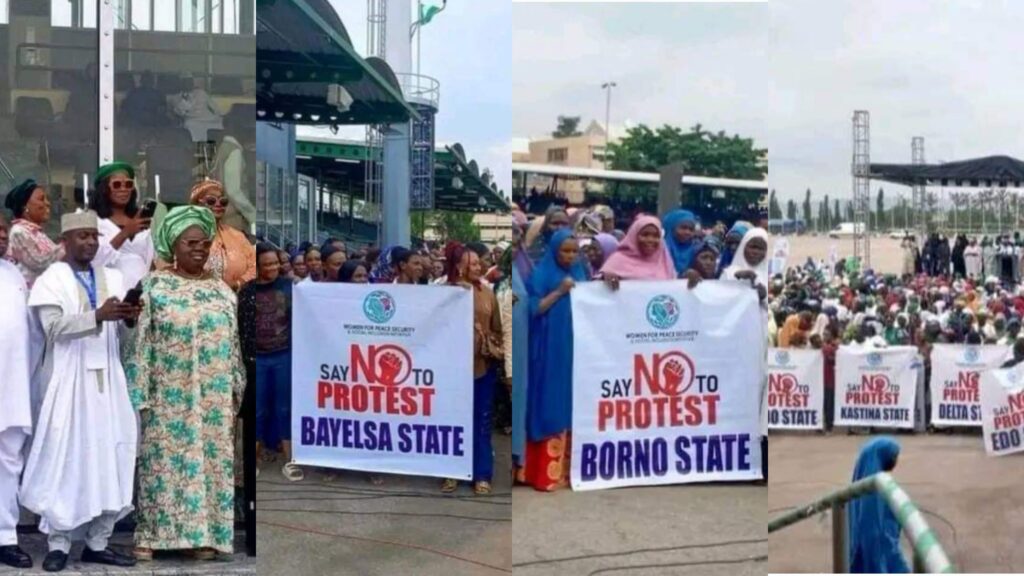
More than 400 Nigerian women have been thrown into lamentation by the ruling All Progressives Congress (APC) leaders in a quest to thwart the planned nationwide protest, tagged #EndBadGovernanceInNigeria.
Some influential women leaders in APC reportedly sent a circular to several Non-Governmental Organisations (NGOs) in Abuja, asking them to mobilise 50 women each to the Eagle’s Square, Abuja to be given 50kg bag of rice each as palliative.
However, after over 400 women were mobilised from various NGOs to Abuja, rather than bags of rice as promised them, they were given banners with “Say No To Protest” with different states, took pictures of them to claim they are against the planned nationwide protest against hardship, thereafter, they were left with neither rice nor transport fare as promised.
The circular sent to the NGOs on Friday and forwarded to investigative news outlet, SaharaReporters, by a member of African Youth Union Commission, Esther Adelana, read, “URGENT: Good day distinguished young active citizens, please if you are in Abuja and can make your way to Eagle Square tomorrow Saturday 9am for palliative distribution by one of our partner accompanied with transport logistics. We need fifty young women.”
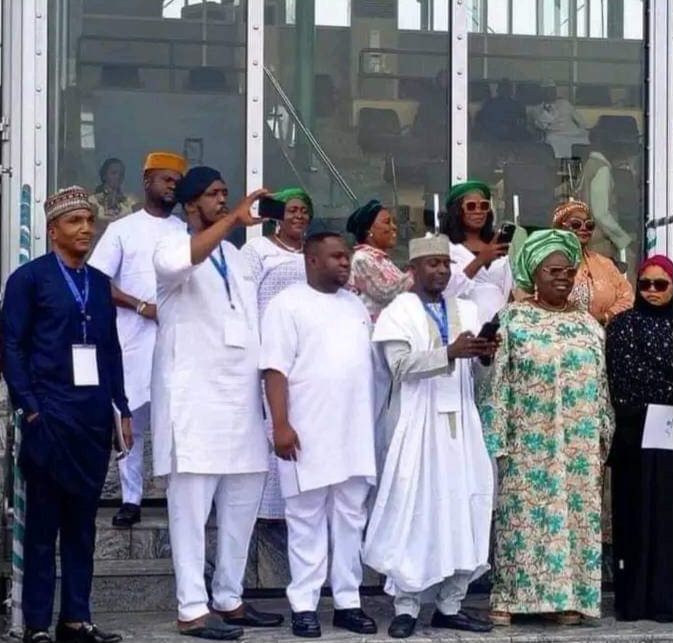
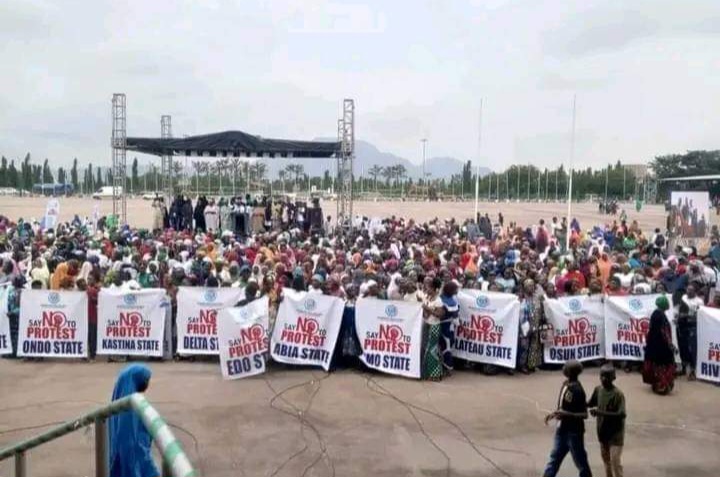
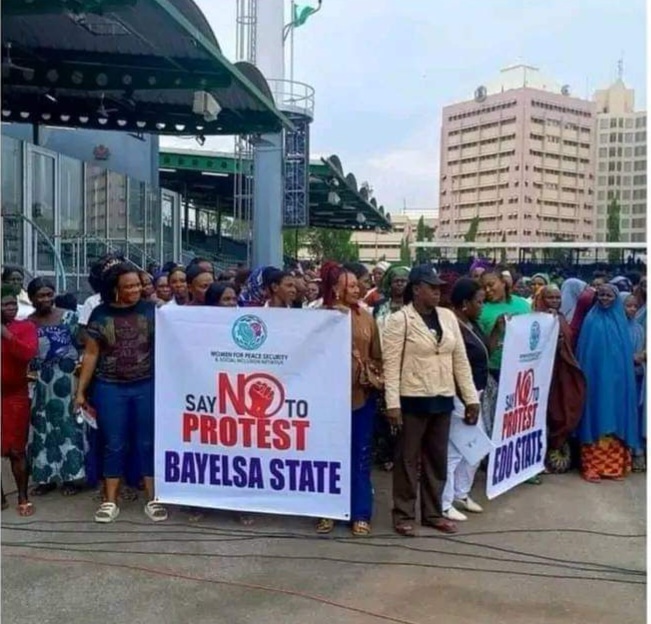
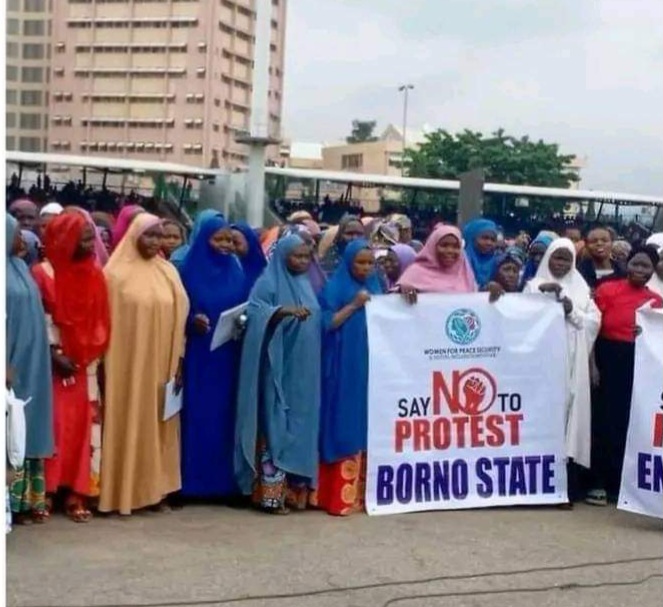
Lamenting the disappointment the women experienced in the hands of the APC leaders, Adelana said: “Believe this leadership at your own risk.
“Few days ago, some influential women leaders in APC sent a message to NGOs, to send 50 delegates each to Eagle square to get 50 kg of rice and some palliative for women.
“This message circulated fast in the NGO community. Almost all NGOs in Abuja got the above circular. We mobilised women to Eagle Square with the hope that they would get something as promised.
“We even sent students from the University of Abuja, only for them to get there and banners imprinted with “SAY NO TO PROTEST” were placed in their hands.
“They were told to take pictures with the banners. The women thought it was an empowerment program but the influential women from APC took pictures with them and left.
“The poor women didn’t get anything – not a cup of rice or even transportation to go back to their various destinations.
“They were used by APC to project their propaganda and were dumped afterwards. The women came back cursing and wailing in their various groups.
“The women came back wailing and cursing that APC women leaders deceived them. They were even threatened with DSS.
“I’m disappointed that Leadership News is projecting lies without verifying the information,” Sahara Reporters, a New York-based publisher quoted the source as saying.
Nigeria is facing its worst economic crisis in decades, with skyrocketing inflation, a national currency in free-fall and millions of people struggling to buy food. Only two years ago Africa’s biggest economy, Nigeria is projected to drop to fourth place this year.
The pain is widespread. Unions strike to protest salaries of around $20 a month. People die in stampedes, desperate for free sacks of rice. Hospitals are overrun with women wracked by spasms from calcium deficiencies.
Although Mr Tinubu increased the minimum wage — after strike action and months-long negotiations with labour unions — from N30,000 to N70,000, his government has increased spending for officials at a time of nationwide starvation.
For workers earning the new N70,000, or $43, per month minimum wage, capricious inflation and naira value have inflicted too much damage for the changes to make any difference in their lives.
The crisis is largely believed to be rooted in two major changes implemented by President Bola Tinubu, elected 14 months ago: the partial removal of fuel subsidies and the floating of the currency, which together have caused major price rises.
A nation of entrepreneurs, Nigeria’s more than 200 million citizens are skilled at managing in tough circumstances, without the services states usually provide. They generate their own electricity and source their own water. They take up arms and defend their communities when the armed forces cannot. They negotiate with armed kidnappers when family members are abducted.
But right now, their resourcefulness is being stretched to the limit.
Some folks are planning protests to voice their concerns about the economic situation, including rising inflation and poverty, under President Tinubu’s administration.
The protests are expected to happen in the north and other parts of the country, but residents and leaders of the south-eastern region, inhabited by the Igbo ethnic group – have made it clear that they are not going to be part of the mass action.
The planned protests have already ignited debates on social media between Mr Tinubu’s supporters — who had previously advocated for similar protests under former president Goodluck Jonathan in 2012 — and next month’s would-be demonstrators.
Mr Tinubu’s government warned that a breakdown of law would not be tolerated, while Nigerians were furious that the same individuals who, in 2012, organised demonstrations against Mr Jonathan’s government for terminating fuel subsidies are now aggressively opposing the same cause under a different leader.
KOIKI Media bringing the world 🌎 closer to your door step
